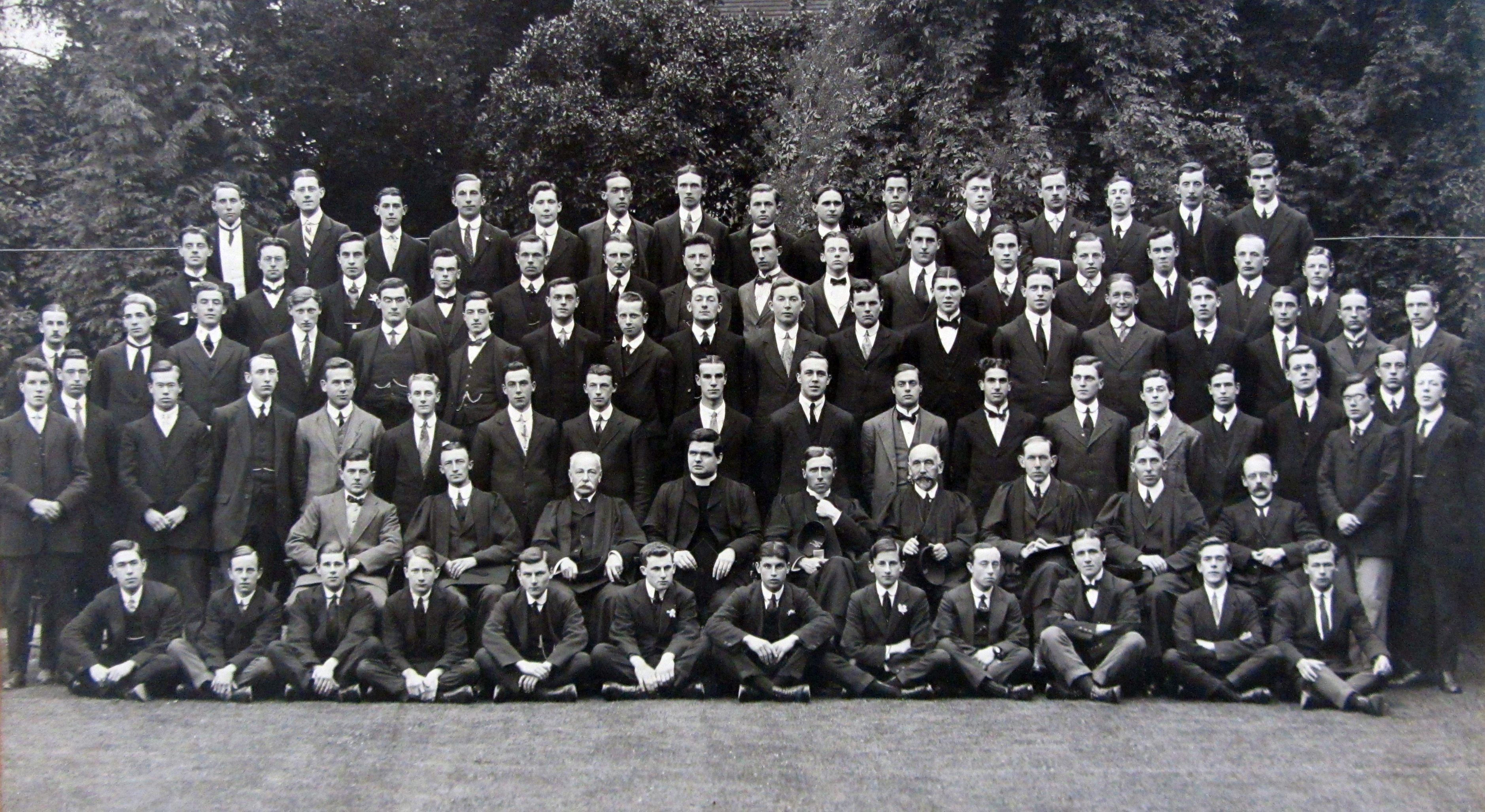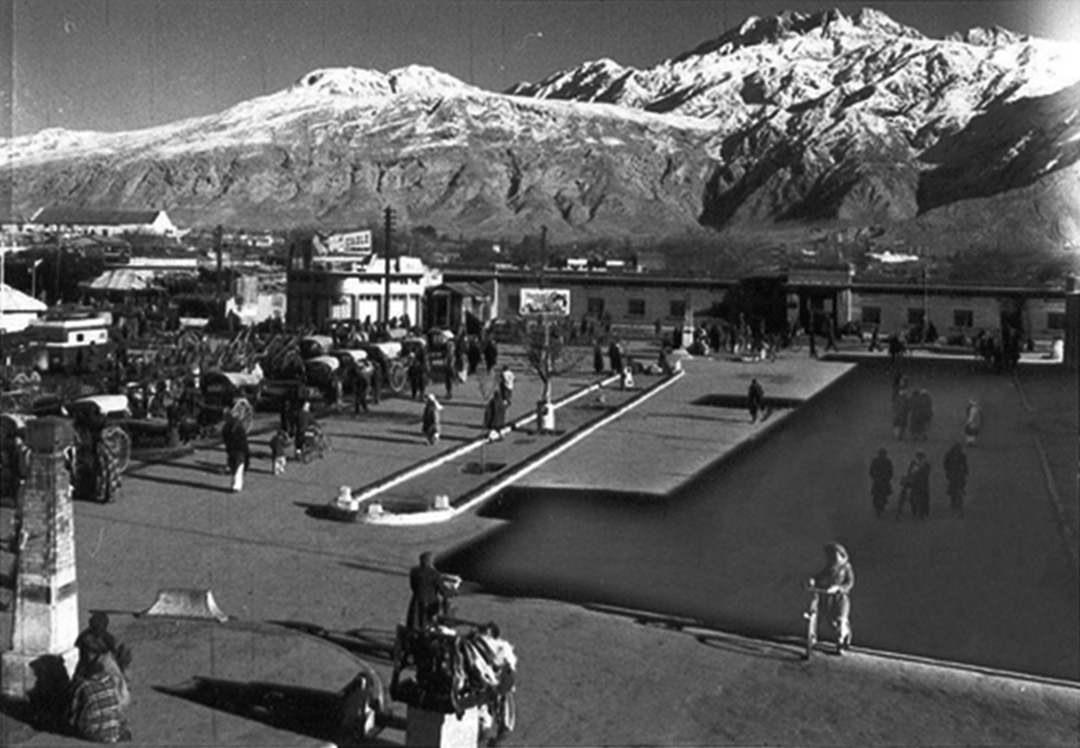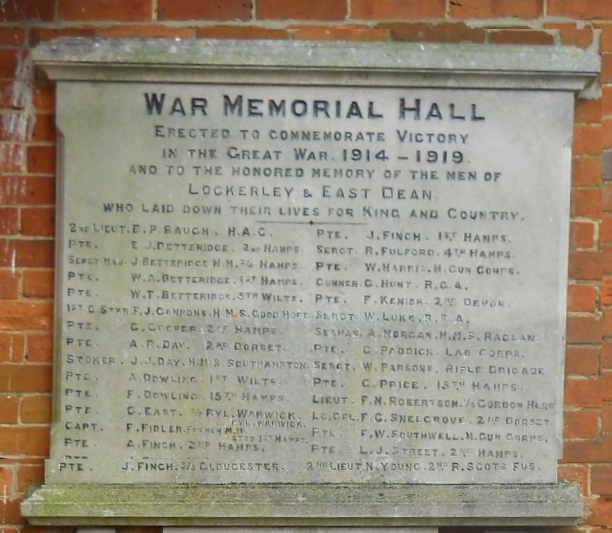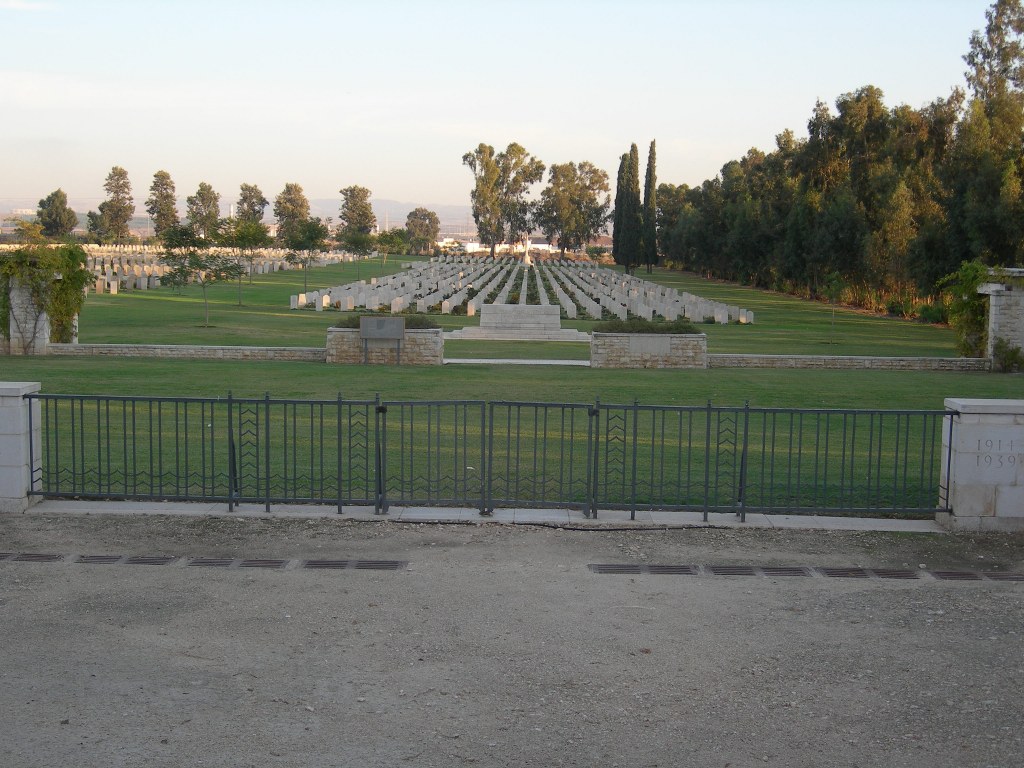Reginald Arthur Fulford
Reginald is incorrectly commemorated on the College War Rail as Robert Fulford.
Sergeant Reginald Arthur Fulford, of the 2/4th (T.F.) Battalion Hampshire Regiment, Regimental Number 200051, died of wounds on 24th November 1917, aged 23, and is buried at Ramleh War Cemetery, Israel.
Reginald was born on 20th January 1894 in Lockerley, Hampshire, the second son of John and Charlotte Fulford. John, a farmer, had been born in Whiteparish, Wiltshire, and Charlotte in Salisbury, Wiltshire. Reginald was baptised in the local parish church. In 1901 the census gives their address as Street Farm, Lockerley, a village near Romsey in Hampshire. Lockerley is and was a small rural village where Reginald would have known everyone and they would have known him. In 1901, at 7 years old, Reginald had an older brother Frederick (9), and a younger brother Ernest (4). He also had two younger sisters, Hilda (3) and Sybil who was 9 months old. Reginald began his education at Lockerley Endowed School, before moving on to the Eastleigh Centre. By the time of the 1911 census there was an addition to the family with Alex (8). Frederick (now 19), along with Ernest (now 14) were both working on the farm with their father, while Reginald, aged 17, was a pupil teacher employed by the County Council. He had in fact returned to his old school in Lockerley. His other siblings were all still at school.
Reginald started his two year formal teacher training in 1912, having taken the Preliminary Examination for Certificate earlier that year, and taking the Archbishops’ Examination for Admission, but only achieving a third class pass.
Students and masters 1913–14. Copyright University of Winchester HRO 47M91W-S5-2-29
The first College exams were taken at the end of the first term. Reginald had an average mark of 57.6%, which put him 22nd in the class order of merit. By the end of his first year he had improved that position up to 16th, and by Christmas of the second year he had improved again and was placed 11th. We know from the College magazine that he represented his dormitory, Paradise Dorm, in the annual Dormitory Cup football competition, and he also represented the College. In a match against St. Cross he was mentioned ‘for his splendid work at outside-right, for this was his first appearance in the first XI.’ In the 1913 Sports Day, he was placed third in the hurdles.
The debating evenings at College saw Reginald seconding Mr. Gibson on the question:
‘Can hunting be classed as a sport? Are not its benefits outweighed by its cruelty?’
They argued against the motion and it was noted that Mr. Fulford ‘gave us many new points’.
In the first year at College the students were referred to as Juniors, becoming Seniors for their final year. There were many sporting competitions between the two groups of students. Many alumni maintained close ties with the College and there were frequent competitions between Past and Present students.
At the end of his two year course Reginald was awarded D grades in Teaching, Music and Drawing and a B grade in Science. He did, however, improve on his Archbishops’ Religious Education Exam gaining a first class pass in both his first and second years.
We have no information to tell us if Reginald took up a teaching post after leaving College or if he went straight into the army. In the Student Record Book there is no school appointment listed for Reginald, which suggests he went straight into uniform.
Reginald enlisted in the 2/4th (T.F.) Battalion of the Hampshire Regiment. We do not know the date of his enlistment. The 2/4th (T.F.) Battalion was formed on Salisbury Plain in 1914 as a home service battalion. As part of the 2nd Wessex Division some of the Regiment sailed for India in December 1914, while some remained behind in England. We know from the diary of fellow Wintonian and regimental member V. S. Manley that Reginald did not arrive in India until later. His diary entry for Thursday 13th April 1916 states:
A batch of another draft from England arrived to strengthen the gradually depleting 1/4th Hampshires. In the evening a terriffic (sic) thunderstorm occurred. The men, having measles amongst them, the entire draft were segregated under canvas between the slaughterhouse and the incinerator! Sgt Fulford, a Wintonian, arrived next day, again, although the railway siding stood idle in barracks, the men, after the trying train journey from Karachi, were compelled to totter along the three miles of road from the station to camp. There were hundreds of mule-carts too, but owing to red tape, the men were forced to crawl along the road with full packs and carrying blankets. Of course, in a few weeks on land, they would march twenty or even thirty miles like that, but three weeks cooping up in troop-ships and trains temporally (sic) saps the life out of the strongest.
Quetta, India (now Pakistan). Copyright unknown.
Nearly every man in our battalion has been rough but they were not in hospital as long as I was. … This keen mountain air seemed to catch hold of the chaps, but they are now settling down nicely.
All day long there sits on our verandah a tailor with a sewing machine. He seems quite content to sit there, and is overjoyed if he can press a suit for two pence or turn up trousers at the same price. Now come very important people, the ‘Dhobees’, or laundrymen. They come for our washing on Sunday and bring it back about Thursday or Friday. The washing by the Dhobees is done in a running stream. The men stand knee-deep near a big stone. The clothes are dipped in the water and then banged against the stone, accompanied with a shout for every whack. They get things remarkably clean, but I won’t say how they look after their treatment. It’s funny when the washing comes back to hear the Dhobee say, ‘One pair socks broke’ (meaning holes).
In 1917 the 4th Battalion moved to Egypt, landing in Suez. They were attached to the 233rd Brigade in the 75th Division. Orders from the War Office allowed for the formation of a new division under General Allenby, incorporating Territorial Force units along with Indian Battalions.
The British Army’s involvement in the Palestine Campaign was originally to protect the strategically important Suez Canal from Ottoman and German control. Although referred to as the Palestine Campaign the land fought over included areas of modern day Israel, Egypt, Jordan, Saudi Arabia and Syria. The force involved in this Campaign was bolstered by Anzac Troops, and the Palestine Theatre became the second largest in terms of force numbers deployed after the Western Front.
It took until October 1917 for the force to be fully established and they took to the field for the first time in the Third Battle of Gaza from the 22nd October to the 7th November, and remained in action for the Capture of Junction Station on the 13th-14th November and the Battle of Nabi Samweil (various spellings are in use including Nebi Samwil) on the 20th-24th November 1917. Ottoman Forces were entrenched on the high land of Nebi Samuel, the traditional burial place of the prophet Samuel. The position was gained late on the evening of the 21st November after fierce fighting. Several counter attacks over the next few days failed. On November 24th the battle of Nabi Samweil was over.
Fulford—Sergeant R.A.Fulford of the Winchester Training College Company 2/4th Hants, died of wounds in Palestine, aged 23 years. Beloved by all for his noble character.
FULFORD—in loving memory of dear Reg. Sergeant R.A. Fulford, Winchester Training College Company, who died of wounds at Palestine on November 24th, 1917, aged 22. I heard a voice saying blessed are the dead which die in the Lord. I know that my Redeemer liveth.
Reginald is buried in the Ramleh War Cemetery in Israel and commemorated on the Lockerley War Memorial at East Dean.
Researcher and Author: Dee Sayers
Photograph from the Students Register held at the Hampshire Record Office
Sources
British Newspaper Archive (1915). Hampshire Telegraph Friday 19 March 1915, p.4. [online] Available at: https://www.britishnewspaperarchive.co.uk/viewer/bl/0001973/19150319/051/0004 [Accessed 2018].
British Newspaper Archive (1917). Bath Chronicle and Weekly Gazette – Saturday 29 December 1917, p.5. [online] Available at: https://www.britishnewspaperarchive.co.uk/viewer/bl/0000221/19171229/114/0005 [Accessed 2018].
British Newspaper Archive (1918). Bath Chronicle and Weekly Gazette – Saturday 30 November 1918, p.5. [online] Available at: https://www.britishnewspaperarchive.co.uk/viewer/bl/0000221/19181130/139/0005 [Accessed 2018].
Commonwealth War Graves Commission, (2018). Home page. [online] Available at www.cwgc.org/ [Accessed 2018]
Lockerley (2018). Home page. [online] Available at: www.lockerley.org.uk [Accessed 2018]
The Long Long Trail, (2018). Welcome to the long long trail. [online] Available at: http://www.longlongtrail.co.uk/ [Accessed 2018]
Vickers, J. The University of Winchester Chapel Memorial Rail image
| University of Winchester Archive “ Hampshire Record Office | ||
| Reference code | Record | |
| 47M91W/ | P2/4 | The Wintonian 1899-1900 |
| 47M91W/ | P2/5 | The Wintonian 1901-1902 |
| 47M91W/ | P2/6 | The Wintonian 1903-1904 |
| 47M91W/ | P2/7 | The Wintonian 1904-1906 |
| 47M91W/ | P2/8 | The Wintonian 1905-1907 |
| 47M91W/ | P2/10 | The Wintonian 1908-1910 |
| 47M91W/ | P2/11 | The Wintonian 1910-1914 |
| 47M91W/ | P2/12 | The Wintonian 1920-1925 |
| 47M91W/ | D1/2 | The Student Register |
| 47M91W/ | S5//5/10 | Photograph of 5 alumni in Mesopotamia |
| 47M91W/ | Q3/6 | A Khaki Diary |
| 47M91W/ | B1/2 | Reports of Training College 1913-1914 |
| 47M91W/ | Q1/5 | Report and Balance Sheets 1904- 1949 |
| 47M91W/ | R2/5 | History of the Volunteers Company 1910 |
| 47M91W/ | W/Q3/6/2 | V.S. Manley’s Diary |
| Hampshire Record Office archive | ||
| 71M88W/6 | List of Prisoners at Kut | |
| 55M81W/PJ1 | Managers’ Minute Book 1876-1903 | |
| All material referenced as 47M91W/ is the copyright of The University of Winchester. Permission to reproduce photographs and other material for this narrative has been agreed by the University and Hampshire Record Office. | ||






